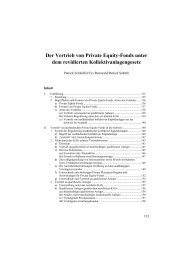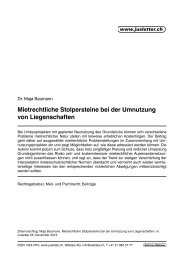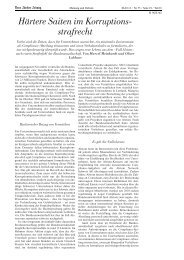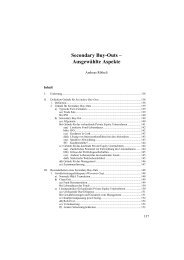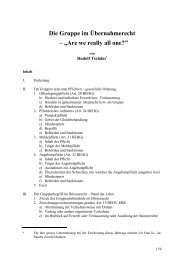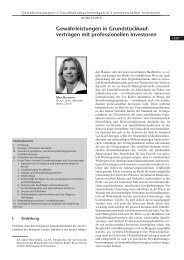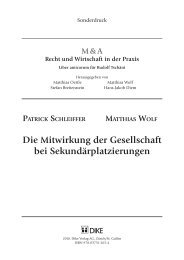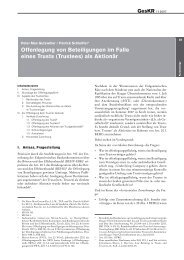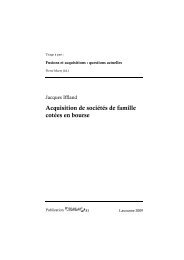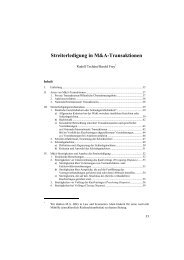Cross-border financial serv - Lenz & Staehelin
Cross-border financial serv - Lenz & Staehelin
Cross-border financial serv - Lenz & Staehelin
You also want an ePaper? Increase the reach of your titles
YUMPU automatically turns print PDFs into web optimized ePapers that Google loves.
Shelby R. du Pasquier / Philipp Fischer – <strong>Cross</strong>-<strong>border</strong> <strong>financial</strong> <strong>serv</strong>ices in and from Switzerland GesKR 4 2010<br />
states that the bank had breached both its duty to<br />
adequately monitor its legal and reputational risks<br />
and the fit and proper test.<br />
• The FINMA’s indirect review of compliance with<br />
foreign rules is also reflected in its decision regarding<br />
the activities of a Swiss bank that were deemed,<br />
in the USA, to have run afoul of the embargo imposed<br />
on Iran by the U.S. Office of Foreign Assets<br />
Control (OFAC) 113 . Following the initiation of proceedings<br />
in the USA in 2007, the FINMA started<br />
monitoring certain cross-<strong>border</strong> activities of the<br />
concerned bank. After its investigation, the FINMA<br />
held that the Swiss prudential framework required<br />
Swiss supervised entities active on a global scale to<br />
duly capture, limit and control their risks (appropriate<br />
risk management) and take the organizational<br />
measures required to achieve this goal (organizational<br />
requirement) 114 . The FINMA’s report on this<br />
case indicates that the Swiss regulator «harshly reprimanded»<br />
the bank and required it to report on disciplinary<br />
measures and provide other clarifications<br />
within a specified timeframe 115 .<br />
• In May 2008, the Swiss regulator opened an investigation<br />
against another major Swiss bank 116 . The<br />
main focus of this investigation was to examine (A)<br />
whether the bank had adequately captured, limited<br />
and supervised the legal and reputational risks associated<br />
with the implementation of the QI Agreement<br />
and with the restrictions applicable to cross-<strong>border</strong><br />
business operations into the USA (see Section III.3<br />
below) and (B), more generally, whether the bank<br />
met the fit and proper test. This investigation of the<br />
bank’s activities revealed an inadequate internal or-<br />
113 According to the U.S. authorities, the Swiss bank had processed<br />
payment in U.S. Dollars for Iranian institutions and had systematically<br />
sought to avoid any reference to Iran in the SWIFT<br />
message that was sent to the U.S. correspondent bank for clearing<br />
purposes. As a result, the payments were not caught by the filters<br />
maintained at the U.S. correspondent bank in order to monitor<br />
compliance with the embargo rules issued by the U.S. Office of<br />
Foreign Assets Control. The relevant payments could thus be<br />
processed contrary to the OFAC rules.<br />
114 See FINMA, Processing of USD payments for countries and<br />
persons sanctioned under the OFAC-Rules, December 16, 2009<br />
(available online at: http://www.finma.ch/e/aktuell/Documents/<br />
bericht-cs-usbehoerden-20091216-e.pdf).<br />
115 FINMA, Processing of USD payments for countries and persons<br />
sanctioned under the OFAC-Rules (FN 114), 7. As regards transactions<br />
with Iran, the FINMA issued on October 18, 2010 a notice<br />
whereby it specifically drew the attention of Swiss-licensed<br />
<strong>financial</strong> intermediaries on the legal and reputational risks deriving<br />
from cross-<strong>border</strong> transactions with Iran, in particular in<br />
light of the fact that the sanctions implemented by the EU and the<br />
USA against Iran go beyond the sanctions imposed in the framework<br />
of the United Nations (FINMA Newsletter 15 (2010), 3<br />
(available online at: http://www.finma.ch/e/finma/publikationen/<br />
Documents/finma-mitteilung-15-2010-e.pdf)).<br />
116 SFBC decision of December 21, 2008, published in FINMA-Bulletin<br />
1 (2010), 76 et seq.<br />
ganization 117 , in particular in view of the dichotomy<br />
existing between the insistence on compliance<br />
with the U.S. regulatory regime and a remuneration<br />
scheme heavily geared towards the acquisition of<br />
new (U.S.) clients and so-called «net new money» 118 .<br />
Whilst stressing that the FINMA’s role is not to<br />
monitor compliance with the laws of every jurisdiction<br />
in which a Swiss <strong>financial</strong> intermediary is active,<br />
the FINMA insisted on the organizational requirements<br />
that apply as a matter of Swiss law: given<br />
«the significant exposure of [the bank] in the USA,<br />
the adherence to U.S. law is an absolute must from<br />
a risk management perspective» 119 . As a sanction,<br />
the FINMA prohibited the bank from conducting<br />
cross-<strong>border</strong> activities in the USA, except through<br />
a SEC-registered entity. On a more general note,<br />
the Swiss regulator also instructed the bank to adequately<br />
capture, limit and supervise the legal and<br />
reputational risks with respect to the provision of<br />
cross-<strong>border</strong> <strong>financial</strong> <strong>serv</strong>ices out of Switzerland 120 .<br />
• In a January 10, 2010 decision, the FINMA emphasized<br />
once again its power to review the compliance<br />
with foreign regulations under the fit and<br />
proper test 121 . A Swiss bank was actively marketing<br />
German-based retail investors through a network<br />
of representatives (in the German text: «Vermittler»)<br />
active on German soil. An investigation conducted<br />
by the FINMA revealed that the Swiss bank<br />
had never determined whether or not its activities in<br />
Germany through its network of «representatives»<br />
would trigger a duty for the bank to obtain a license<br />
from the German authorities (this was probably the<br />
case 122 , see also Section III.1.2ba below). In light<br />
of the above, the FINMA held that the Swiss bank<br />
had breached the fit and proper test, in particular<br />
because the Swiss bank had not made any effort to<br />
clarify its regulatory duties in foreign jurisdictions,<br />
despite the fact that its business model was heavily<br />
geared towards cross-<strong>border</strong> activities. Given the<br />
cooperation of the bank during the investigation,<br />
the replacement of its senior management and the<br />
termination of the relationships with the «repre-<br />
117 The Swiss regulator refrained from blaming any individuals within<br />
the bank, stating that «these failures have to be attributed to<br />
the bank as a whole, as a complex company» (SFBC decision of<br />
December 21, 2008 (FN 116), 99, para. 88).<br />
118 SFBC decision of December 21, 2008 (FN 116), 92, para. 75, 96<br />
para. 83; see also Christian Bovet/Anath Guggenheim, Surveillance<br />
des marchés financiers: rétrospective pour perspectives<br />
II, in Thévenoz/Bovet (Ed.), Journée 2009 de droit bancaire et<br />
financier, Geneva 2010, 115 et seq. Pursuant to the FINMA Circular<br />
2010/1, para. 36, compensation systems implemented by<br />
Swiss-licensed <strong>financial</strong> intermediaries must be structured in<br />
such a way as to ensure compliance with applicable regulations.<br />
119 SFBC decision of December 21, 2008 (FN 116), 97, para. 85.<br />
120 SFBC decision of December 21, 2008 (FN 116), 100, para. 89–92.<br />
121 FINMA decision of January 11, 2010, published in FINMA-Bulletin<br />
1 (2010), 102 et seq.<br />
122 FINMA decision of January 11, 2010 (FN 121), 114, para. 54–55.<br />
451<br />
Aufsätze



